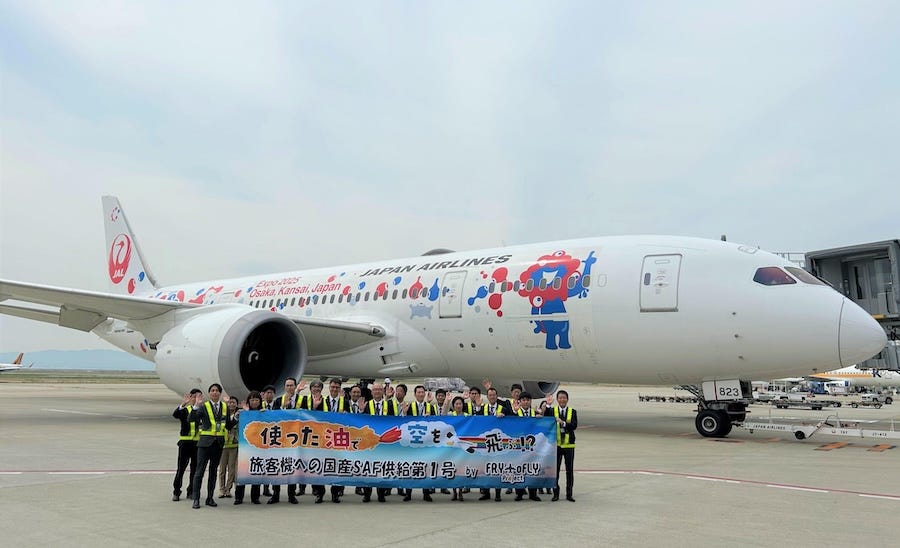#Sustainability20: Joby achieves testing landmark with piloted aircraft & more
Weekly Roundup - 02/05/25
Each Friday, we publish a round-up of the 20 most important stories on sustainable aviation. You can see previous editions of #Sustainability20 here.
Industry Updates
Natilus and Palantir Technologies have formed a strategic partnership to enhance US sustainable aircraft production using AI for supply chain optimisation and manufacturing efficiency, focusing on blended-wing-body designs like KONA and HORIZON.
The GRAMM Consortium has applied for UK funding to build a 250,000-ton/year SAF plant in Barrow, targeting 53.5% of the UK’s 2035 SAF goal. The project has included carbon capture and partnerships with TotalEnergies and Axens.
Exeter Airport has conducted the UK’s first hydrogen-powered aircraft turnaround using green hydrogen-fuelled ground equipment. The trial, supported by the CAA’s Hydrogen Challenge, has aimed to reduce CO2 emissions from diesel-powered GPUs and tugs.
Japan Airlines has operated its first flight using domestically produced SAF from waste cooking oil under the Fry to Fly initiative. The Kansai-Shanghai route has marked the start of a continuous SAF supply chain in Japan.
Air New Zealand has revised its 2030 emissions target to a 20-25% reduction via SAF and efficiency measures. The airline has abandoned SBTi-aligned goals due to slow tech commercialisation but retained its 2050 net-zero commitment.
Emergency medical services operator ADAC and Germany’s DLR aerospace research centre have found a 33-44% reduction in ultra-fine particles from helicopters using 38% SAF blends. The study has validated SAF’s environmental benefits without compromising engine performance.
CLIMATE WATCH: Arctic plant study reveals an ‘early warning sign’ of climate change upheaval - The Guardian
Scientists have documented Arctic ecosystem shifts over 40 years, revealing shrub dominance due to rapid warming. The study, published in Nature, has highlighted climate impacts on native flora like mosses and lichens.
Infrastructure and operational efficiencies
Pittsburgh International Airport has expanded its solar capacity by 4.7 MW on a former landfill site, bringing its total to 23 MW. The project, developed with Duquesne Light and IMG Energy, has targeted cutting 5 million pounds of CO2 annually by 2027.
PACE Airports has launched real-time emissions tracking for Christchurch Airport, analysing over 10 billion data points to improve sustainability strategies. The platform has enabled airports and financiers to monitor aviation-related carbon footprints dynamically.
Sustainable Aviation Fuel (SAF)
easyJet has signed an MoU with World Fuel Services and ATOBA to secure long-term SAF supply using diversified production technologies. The agreement has addressed scaling challenges and pricing volatility to accelerate industry adoption.
Bangchak Group has inaugurated Thailand’s first 100% SAF plant, processing used cooking oil via HEFA technology. The facility has produced 1 million litres daily and achieved ISCC certification for sustainable fuel distribution.
Zhejiang Jiaao Enprotech has secured China’s first SAF export license for its 372,400-ton annual capacity plant. The facility, partly owned by BP, has aimed to supply domestic and international markets pending a national blending mandate.
OMV has launched Austria’s largest green hydrogen plant, producing 1,500 tons annually to support SAF and renewable diesel. The €25 million facility has reduced CO2 emissions by 15,000 tons yearly using renewable energy.
Topsoe has secured its first Chinese SAF project, supplying HydroFlex™ tech to Guangxi Hongkun Biomass for 300,000 tons/year of renewable fuel. Construction has begun, with production expected by 2026.
Sentient Signature has partnered with Azzera to offset all flight emissions using carbon credits and SAF certificates. The initiative has aligned with aviation’s net-zero goals without additional client costs.
UAE-based Bin Zayed International Group (BZI) and Malaysia’s FatHopes Energy (FHE) have partnered to build a $500M SAF refinery in Port Klang using HEFA technology. The project has targeted 2029 operations to serve Southeast Asia’s aviation sector.
Deutsche Aircraft has prepared to test the D328eco regional turboprop, designed for 100% SAF compatibility. The aircraft has aimed to replace ageing fleets while reducing fuel consumption per passenger by 14%.
NTPC Green Energy has collaborated with Honeywell to explore SAF production using green hydrogen and captured CO2. The initiative has aligned with India’s 500 GW renewable energy and green hydrogen goals.
New technology: Electric and Hydrogen
Joby Aviation has completed piloted transition flights for its eVTOL aircraft, including simulated emergencies and redundancy tests. The company has aimed to deliver services in Dubai by mid-2025 after conducting thousands of ground and flight tests.
Diamond Aircraft has collaborated with Austrian institutes on the H2EDT project, developing a hybrid hydrogen-electric testbed to address hydrogen storage, safety, and certification challenges. Research has included designing a digital twin and parallel hybrid architecture for aviation applications.
ZT1 Technology and Liberty Aerospace have signed an MoU to electrify the Liberty XL-2 aircraft, targeting experimental flight testing by late 2026. The partnership has leveraged ZT1’s propulsion expertise and Liberty’s airframe design for sustainable flight training and private aviation.






